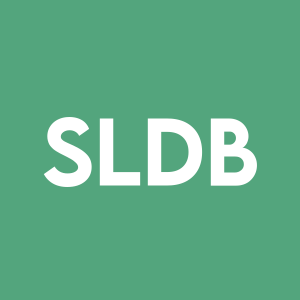Solid Biosciences Receives FDA Fast Track Designation for SGT-501 First-in-Class Gene Therapy for Catecholaminergic Polymorphic Ventricular Tachycardia (CPVT)
Rhea-AI Summary
Solid Biosciences (NASDAQ:SLDB) has received FDA Fast Track designation for SGT-501, its novel gene therapy treatment for catecholaminergic polymorphic ventricular tachycardia (CPVT). This designation adds to previously received FDA IND clearance, Orphan Drug, and Rare Pediatric Disease designations.
SGT-501 is designed as a first-in-class AAV-based gene therapy that delivers a functional CASQ2 gene to cardiac muscle cells, targeting the underlying causes of CPVT, a life-threatening cardiac condition. The therapy has received both FDA IND clearance and Health Canada CTA approval.
The company plans to initiate a Phase 1b clinical trial in Q4 2025, which will be a first-in-human, open-label, multicenter study evaluating the safety, tolerability, and efficacy of SGT-501.
Positive
- None.
Negative
- Phase 1b clinical trial yet to begin - early stage of development
- No FDA-approved therapies exist for CPVT, indicating potential regulatory challenges
News Market Reaction
On the day this news was published, SLDB gained 8.51%, reflecting a notable positive market reaction. Argus tracked a peak move of +7.4% during that session. Our momentum scanner triggered 20 alerts that day, indicating elevated trading interest and price volatility. This price movement added approximately $43M to the company's valuation, bringing the market cap to $552M at that time.
Data tracked by StockTitan Argus on the day of publication.
- SGT-501 has now received FDA Fast Track, Orphan Drug and Rare Pediatric Disease designations -
- Potential first-in-class therapy with FDA IND clearance and Health Canada CTA approval designed to address underlying causes of CPVT, a life-threatening, arrhythmogenic cardiac condition -
- Solid expects to initiate Phase 1b clinical trial of SGT-501 in the fourth quarter of 2025 -
CHARLESTOWN, Mass., July 23, 2025 (GLOBE NEWSWIRE) -- Solid Biosciences Inc. (Nasdaq: SLDB), a clinical stage life sciences company developing precision genetic medicines for neuromuscular and cardiac diseases, today announced that it received Fast Track designation from the U.S. Food and Drug Administration (FDA) for SGT-501, the Company’s novel, AAV-based investigational gene therapy for the treatment of catecholaminergic polymorphic ventricular tachycardia (CPVT). SGT-501 will deliver a functional, full-length, codon-optimized copy of the human cardiac calsequestrin (CASQ2) gene to cardiac muscle cells, an approach intended to address the underlying ryanodine receptor (RYR2) instability and calcium dysregulation seen in CPVT, thereby normalizing cardiac rhythm in diastole.
Fast Track designation is granted to products that are developed to treat serious or life-threatening conditions and demonstrate the potential to address unmet medical needs. This designation is intended to facilitate development and expedite review of qualifying drugs. SGT-501 will benefit from this designation through more frequent interactions with the FDA along with the potential to be eligible for priority review.
Jessie Hanrahan, Ph.D., Chief Regulatory & Preclinical Operations Officer of Solid Biosciences, commented: “FDA IND clearance and Fast Track designation provide important scientific validation of SGT-501 and recognition of the continuing and severe unmet needs posed by CPVT. We believe SGT-501’s robust preclinical and CMC data package supports the potential for a durable and transformational treatment for a disease that has no FDA-approved therapies. SGT-501 is our third IND clearance in the past two years, demonstrating Solid’s deep regulatory expertise in the genetic medicines space. We want to thank the FDA for their support and partnership and look forward to continued collaboration with regulators globally as we advance our cardiac and neuromuscular candidates.”
FDA Investigational New Drug (IND) clearance and Health Canada Clinical Trial Application (CTA) approval for SGT-501 were announced on July 8, 2025. The planned Phase 1b trial will be a first-in-human, open-label, multicenter study to evaluate the safety, tolerability and efficacy of SGT-501 and is expected to initiate in the fourth quarter of 2025.
About Fast Track Designation
The FDA’s Fast Track program facilitates the expedited development and review of new drugs that are intended to treat serious or life-threatening conditions and demonstrate the potential to address unmet medical needs.
About SGT-501
SGT-501 is an AAV-based gene therapy candidate designed to deliver a functional, full length, codon-optimized copy of the human cardiac calsequestrin (CASQ2) gene to heart muscle cells. In the context of RYR2 variants, increasing CASQ2 protein levels enhances buffering of free calcium in the sarcoplasmic reticulum, stabilizing the RYR2, which results in reduced diastolic calcium leak into the cytosol. Stabilization of the RYR2 in its closed conformation supports the maintenance of normal cardiac rhythm with the potential to protect against ventricular tachycardia. SGT-501 received Fast Track, Orphan Drug and Rare Pediatric Disease designations from the U.S. FDA and has potential as a first-in-class therapy to correct the underlying RYR2 instability and calcium dysregulation causes of CPVT.
The AAV-CASQ2 gene therapy approach utilized by SGT-501 was pioneered by Dr. Silvia Priori and her team in IRCCS Maugeri Pavia, Italy. As a globally recognized leader in inherited arrhythmias, Dr. Priori has long been at the forefront of translational cardiac research. Solid Biosciences in-licensed this innovative therapeutic in 2023 and subsequently advanced it into IND-enabling preclinical development, marking an important step toward bringing this potential treatment to individuals living with CPVT.
About Catecholaminergic Polymorphic Ventricular Tachycardia
Catecholaminergic polymorphic ventricular tachycardia (CPVT) is a heart condition marked by abnormal rhythms; specifically, an abnormally fast heartbeat (ventricular tachycardia), which can be triggered by adrenergic stimulation such as physical activity or emotional stress. These arrhythmias can cause unexplained fainting, seizures, cardiac arrest and sudden death. CPVT is estimated to affect roughly 1 in 10,000 individuals globally, although it is often misdiagnosed, and is typically identified in children and young adults. It is mainly caused by mutations in the RYR2 and CASQ2 genes, which disrupt calcium regulation in heart muscle cells, impairing proper heart contraction and relaxation. There are currently no treatments that address the underlying mechanisms of CPVT.
To learn more about CPVT and SGT-501, watch a brief CPVT expert and patient video by clicking here.
About Solid Biosciences
Solid Biosciences is a precision genetic medicine company focused on advancing a portfolio of gene therapy candidates targeting rare neuromuscular and cardiac diseases, including Duchenne muscular dystrophy (Duchenne), Friedreich’s ataxia (FA), catecholaminergic polymorphic ventricular tachycardia (CPVT), TNNT2-mediated dilated cardiomyopathy, BAG3-mediated dilated cardiomyopathy, and additional fatal, genetic cardiac diseases. The Company is also focused on developing innovative libraries of genetic regulators and other enabling technologies with promising potential to significantly impact gene therapy delivery cross-industry. Solid is advancing its diverse pipeline and delivery platform in the pursuit of uniting experts in science, technology, disease management, and care. Patient-focused and founded by those directly impacted by Duchenne, Solid’s mission is to improve the daily lives of patients living with devastating rare diseases. For more information, please visit www.solidbio.com.
Forward-Looking Statements
This press release contains “forward-looking statements” within the meaning of the Private Securities Litigation Reform Act of 1995, including statements regarding future expectations, plans and prospects for the Company; the ability to successfully achieve and execute on the company’s goals, priorities and achieve key clinical milestones; the Company’s pipeline of programs for neuromuscular and cardiac diseases, including its SGT-501, SGT-212 and SGT-003 programs and expectations for CTA filings, site activations, clinical development, initiation and enrollment in clinical trials, dosing, availability of clinical trial data and potential accelerated approval; the sufficiency of the Company’s cash, cash equivalents, and available-for-sale securities to fund its operations; and other statements containing the words “anticipate,” “believe,” “continue,” “could,” “estimate,” “expect,” “intend,” “may,” “plan,” “potential,” “predict,” “project,” “should,” “target,” “would,” “working” and similar expressions. Any forward-looking statements are based on management’s current expectations of future events and are subject to a number of risks and uncertainties that could cause actual results to differ materially and adversely from those set forth in, or implied by, such forward-looking statements. These risks and uncertainties include, but are not limited to, risks associated with the company’s ability to advance SGT-501, SGT-212, SGT-003, SGT-601, SGT-401 and other preclinical programs and capsid libraries on the timelines expected or at all; obtain and maintain necessary approvals from the FDA and other regulatory authorities; replicate in clinical trials positive results found in preclinical studies and early-stage clinical trials of the company’s product candidates; obtain, maintain or protect intellectual property rights related to its product candidates; compete successfully with other companies that are seeking to develop CPVT, Duchenne, Friedreich’s ataxia and other neuromuscular and cardiac treatments and gene therapies; manage expenses; and raise the substantial additional capital needed, on the timeline necessary, to continue development of SGT-501, SGT-212, SGT-003, SGT-601, SGT-401 and other candidates, achieve its other business objectives and continue as a going concern. For a discussion of other risks and uncertainties, and other important factors, any of which could cause the company’s actual results to differ from those contained in the forward-looking statements, see the “Risk Factors” section, as well as discussions of potential risks, uncertainties and other important factors, in the company’s most recent filings with the Securities and Exchange Commission. In addition, the forward-looking statements included in this press release represent the company’s views as of the date hereof and should not be relied upon as representing the company’s views as of any date subsequent to the date hereof. The company anticipates that subsequent events and developments will cause the company's views to change. However, while the company may elect to update these forward-looking statements at some point in the future, the company specifically disclaims any obligation to do so.
Solid Biosciences Contact:
Nicole Anderson
Director, Investor Relations and Corporate Communications
Solid Biosciences Inc.
investors@solidbio.com
Media Contact:
Glenn Silver
FINN Partners
glenn.silver@finnpartners.com








